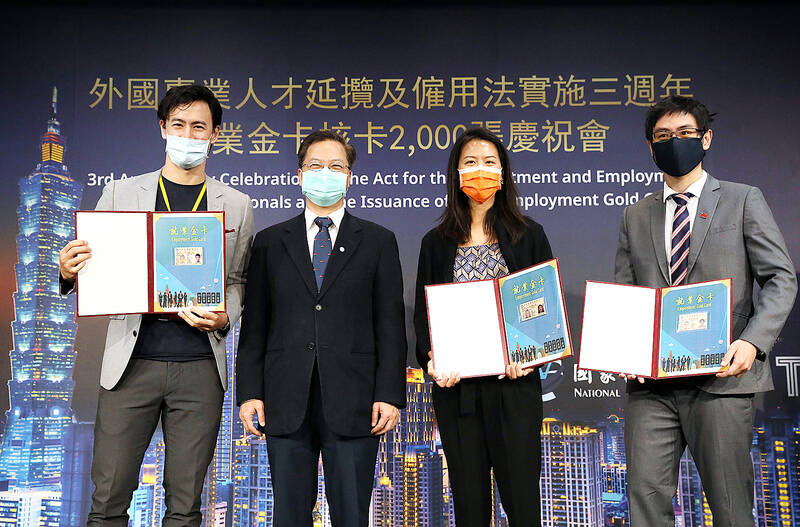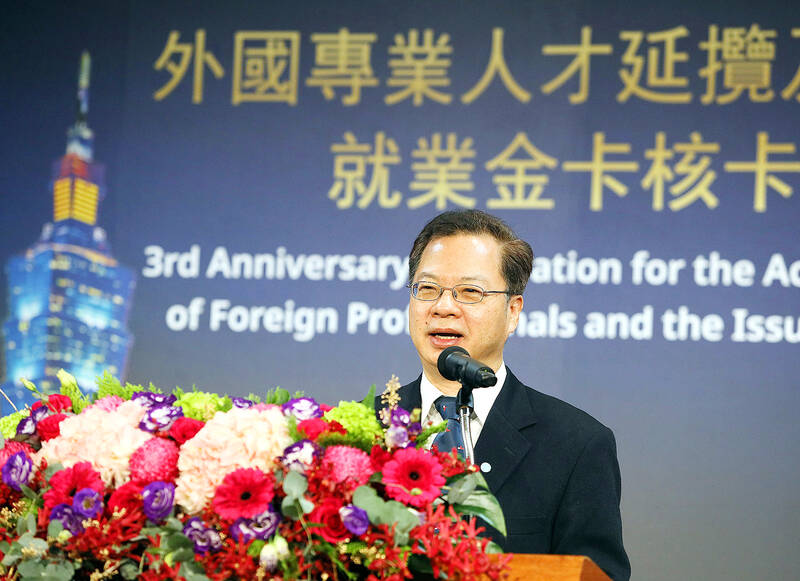Taiwan Plus, the wide-ranging and useful government news site, had a short feature last week on the government’s plan to attract 400,000 foreign workers over the next decade. The feature reported on the experiences of foreigners here and the challenges they face in Taiwan.
That same week, the government announced another batch of special foreigners who received citizenship without having to give up their previous citizenship, another slap in the face to all the ordinary foreigners from elsewhere who have run businesses or taught or raised families here for many years, but cannot access this program. Repeated public trumpeting that there exists a special, higher class of foreigners simply rubs salt in the wound for us low-caste foreigners.
The juxtaposition of these two stories brought into sharp focus the government’s announcement of yet another high-sounding vaporware policy goal and the reality of Taiwan’s stagnant, boss-favoring economy, its inward-looking business institutions, and its outdated, onerous visa caste system.

Photo: CNA
None of that is very interesting, and in fact, it is not difficult to find countries that are as bad or worse. But Taiwan bills itself as foreigner-friendly and says it is actively seeking foreigners. The hypocrisy thus ranges from annoying to infuriating.
UNATTRACTIVE CONDITIONS
Consider, as journalist Hilton Yip observed on Twitter, that Taiwan is one of the few nations that bans dual citizenship for foreigners but not for its own nationals.

Photo: CNA
Commentator Roy Ngerng (鄞義林), always perceptive, observed that the government’s grandiose goals conflict with the reality of its economy. When the system does not transform itself, he said, foreign talent attracted to Taiwan cannot find a place. Taiwan “wants to remain a low-cost manufacturing center” in which labor is controlled from the top down. “But if Taiwan wants to become higher-value, it needs to become higher paid … to treat workers as thinkers who help create solutions, not labor who are forced to comply,” he posted on Twitter.
Chason Daily, another Taipei-based political commentator, echoed this in the Taiwan Plus report, describing the Gold Card system: “it’s definitely much easier from the government perspective to create something like the Gold Card than it is to institute very deep system changes.”
This story reminds us, once again, that in Taiwan foreigners basically have two roles: conferring status, and validating. If they step outside those roles to become full and complicated human beings, they become annoyances, even threats.
Taiwan’s economy is a bedrock issue. Its low salaries and long work hours are not only unattractive to skilled foreigners but are in fact driving Taiwanese themselves to migrate in search of work.
University pay is a fraction of what a skilled researcher could make in a developed country, and there they could have meaningful input into the running of the department. Universities here often refuse to hire foreigners, because their administrative workloads are so great that each foreign hire simply means more work for the local profs, because few foreigners can fill out forms in Chinese. Such hidden barriers must be removed, but the impetus for systemic change is non-existent.
VISA ISSUES
Other issues abound. For example, it is emblematic of Taiwan’s obsession with foreigners as status-conferrers that the nation has no digital nomad visa, a reflection of the general government contempt for adventure travelers and backpackers, and its preference for well-heeled tourists who can be schlepped around in herds to spend money shopping in cities.
If a local foreigner wants to change their visa, in many cases they must leave the country and then return, an expensive, time-consuming annoyance that threatens life and health in the COVID-19 era. It also increases workloads at customs and Taiwan consulates abroad, when visas could be quickly switched at the local Ministry of Foreign Affairs (MOFA) office.
When 400,000 foreigners are in Taiwan, hundreds will want to marry each other. They will then find that MOFA effectively does not recognize marriages contracted in Taiwan between two foreigners. In that case, the marriage must be recognized by the respective home countries before MOFA will permit visas to be changed, which of course must be done outside Taiwan.
Our school just lost a very fine math teacher who moved to his wife’s home country in part because of this needless visa complication. Their children will have another nationality, instead of being Taiwanese. Do we not need children here?
The visa issue acquires real urgency in Taiwan’s rejection of refugees and family migration, as a longtime journalist here pointed out on Twitter. Refugees represent a vast pool of young people willing to work, often with young children who could acculturate here. But Taiwan will have none of them.
The government’s refusal to accept a few thousand Hong Kong refugees on “security” grounds was rendered particularly obnoxious and absurd, because Taiwan already has hundreds of thousands of spouses from China, who predictably started a pro-China political party.
MAJOR CHANGES NEEDED
Resident foreigners also run into many social issues. Foreigners are sometimes refused rentals because they are foreign, a problem that is worse for females, in my observation. I know several bitter small businesses owners who report much greater harassment from the local authorities.
Tried banking? Better make a will: just depositing a simple check can take a geological era. Banking horror stories are a staple of foreigner humor in Taiwan. There are also several subsidy programs that foreigners cannot take advantage of. Got money and skills? Thailand offers a ten-year visa for skilled or moneyed farangs and wants a million foreigners to take advantage of it. Singapore, UAE, and other nations have similar offerings. Why would a foreigner with skills or cash want to live in Taiwan when they can loll on a beach in Thailand?
If Taiwan really wants to be foreigner friendly, it needs to make major changes. It needs to pay its own people more and reduce their working hours. It needs to ensure that all types of visas can be conveniently changed at MOFA or immigration offices in Taiwan. It needs a digital nomad visa, pronto. It needs to reform its banking system, its immigration policies and its refugee policies. It needs to directly address the largely latent but deep-rooted xenophobia so many of us encounter here.
The outward friendliness of the locals should not be confused with the friendliness of government policy. At present the 400K foreigner policy looks like another Asia-Pacific Regional Operations Center-style vaporware scheme that will not implemented because Taiwan won’t make the changes it desperately needs to make.
Changes it should be making even without all the noise about increasing the number of foreigners.
Notes from Central Taiwan is a column written by long-term resident Michael Turton, who provides incisive commentary informed by three decades of living in and writing about his adoptive country. The views expressed here are his own.

Taiwan has next to no political engagement in Myanmar, either with the ruling military junta nor the dozens of armed groups who’ve in the last five years taken over around two-thirds of the nation’s territory in a sprawling, patchwork civil war. But early last month, the leader of one relatively minor Burmese revolutionary faction, General Nerdah Bomya, who is also an alleged war criminal, made a low key visit to Taipei, where he met with a member of President William Lai’s (賴清德) staff, a retired Taiwanese military official and several academics. “I feel like Taiwan is a good example of

March 2 to March 8 Gunfire rang out along the shore of the frontline island of Lieyu (烈嶼) on a foggy afternoon on March 7, 1987. By the time it was over, about 20 unarmed Vietnamese refugees — men, women, elderly and children — were dead. They were hastily buried, followed by decades of silence. Months later, opposition politicians and journalists tried to uncover what had happened, but conflicting accounts only deepened the confusion. One version suggested that government troops had mistakenly killed their own operatives attempting to return home from Vietnam. The military maintained that the

Jacques Poissant’s suffering stopped the day he asked his daughter if it would be “cowardly to ask to be helped to die.” The retired Canadian insurance adviser was 93, and “was wasting away” after a long battle with prostate cancer. “He no longer had any zest for life,” Josee Poissant said. Last year her mother made the same choice at 96 when she realized she would not be getting out of hospital. She died surrounded by her children and their partners listening to the music she loved. “She was at peace. She sang until she went to sleep.” Josee Poissant remembers it as a beautiful

Before the last section of the round-the-island railway was electrified, one old blue train still chugged back and forth between Pingtung County’s Fangliao (枋寮) and Taitung (台東) stations once a day. It was so slow, was so hot (it had no air conditioning) and covered such a short distance, that the low fare still failed to attract many riders. This relic of the past was finally retired when the South Link Line was fully electrified on Dec. 23, 2020. A wave of nostalgia surrounded the termination of the Ordinary Train service, as these train carriages had been in use for decades